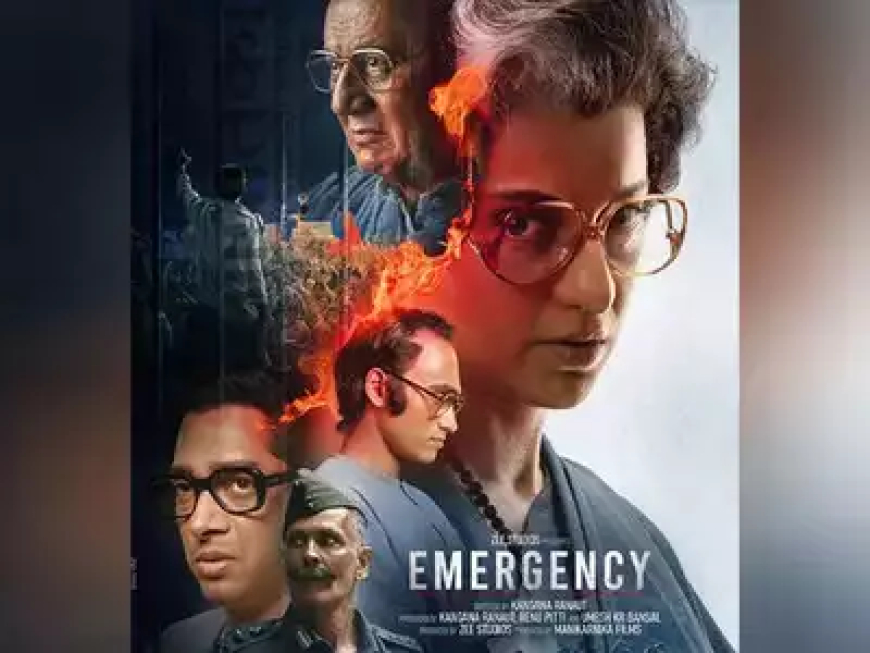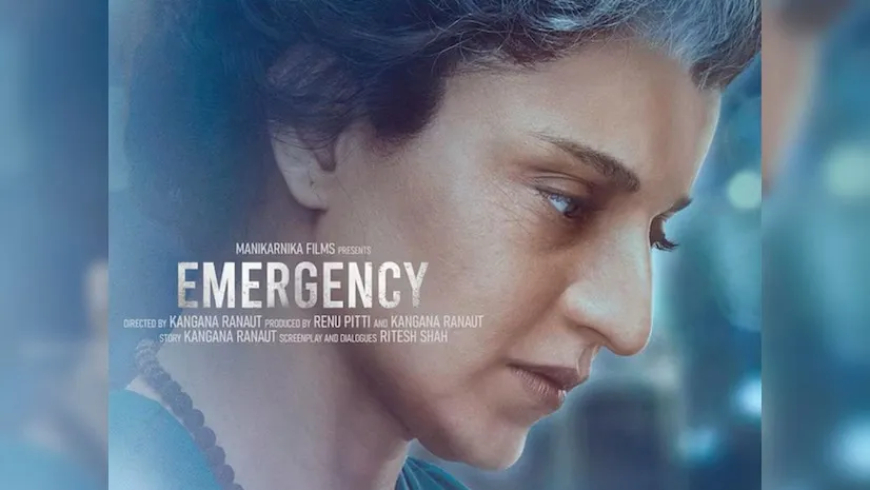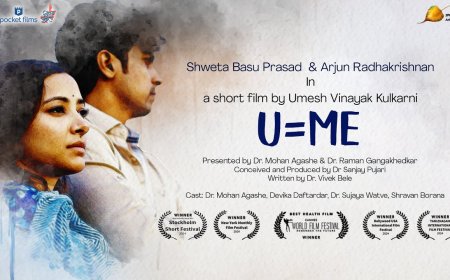EMERGENCY : Half-Baked Tribute to Indira Gandhi
Kangana Ranaut's Emergency, a politically charged biopic of Indira Gandhi, fails to do justice to the historical narrative, instead leaning towards mainstream dramatization. Read the full review by Dr. Shoma A. Chatterji.
Is Emergency a political film? Yes, and no. Yes, because the very idea of this film triggered the idea in Kangana Ranaut to appease the ruling party at the centre and get one more National Award. And the best way to achieve this was to make a film on an internationally famous personality the Establishment at the centre was intent on blackening in an oblique way. No, because somewhere along the way during the process of the making of the film, Ranaut, a sitting MP of the BJP-led govt at the centre, fell foul of the Establishment for some smelly comments she made in public and was stranded by the same political party that backed her with several National Awards and a Party ticket to contest in the general elections which she won hands down.
The censor certificate went through many hiccups since 2023 and the film finally released in 2025. Is this an example of Ranaut falling out of favour of the same Party that pushed her to political power? Emergency therefore, did not get a theatrical release and was finally released on NETFLIX, the OTT platform.
From this point of view, Emergency turned out to be a biography of Indira Gandhi, of which the Emergency between 1975 and 1977 is just a dark part of her otherwise controversial but universally famous life. So, the title of the film is a misnomer. Emergency happens to be a small slice of the entire film which actually traces the life of Indira Gandhi from the time she was a little girl and complained about her mother being ill-treated by her aunt Vijaylakshmi Pandit for the former’s contagious illness. The girl Indira also asks her grandfather Motilal Nehru the meaning of power and so on. This is where the film begins and ends with the assassination of Indira Gandhi. The film sheds light on the young Indira being chastised by her own father for not consulting him on her political decisions. The film shows that she was perhaps disappointed and hurt for her father not naming her as his political successor but naming Lal Bahadur Shastri who is given a sad one or two-minute screen time of which, half was spent on his florally filled dead body!
So, how does Emergency turn out to be – as a film, as a biopic and as the depiction of one of the darkest phases of Independent India’s political history? Kangana Ranaut, who has portrayed the protagonist and also directed the film in addition to having produced it along with some of her like-minded friends, has taken pains to give of her best to the most ambitious project in her career till now. Her performance, though quite loud at places and the original facial tics being repositioned in the film, is outstanding to say the least.
It would have really been a classic film fit for the archive had not Ranaut chosen to go the mainstream way and make leading politicians of the time such as Jayprakash Narayan (Anupam Kher), a young Atal Bihari Bajpeyee (Shreyas Talpade), Miind Soman (Sam Maneckshaw), Jagjiivan Ram (Satish Kaushik) and Indira Gandhi herself break into a patriotic song which must have made these stalwarts turn in their graves had they been buried but they are not as, other than Sam, they are Hindu. These stood out like a sore thumb in the film and took away from it the seriousness and the dignity the film demanded. One has never seen or heard or even seen captured on the television screen these personalities breaking into a song.
Anupam Kher is outstanding as Jayprakash Narayan but his close affinity with the Party at the centre smells strongly of his political inclinations to back a kind of film that teeters between being pro-govt and anti-Emergency because Ranaut probably fell foul of her solid support of the Ruling Party mid-way during the making of the film or, was unsure of the ‘Great Support’. The real discovery of the film’s cast is Vishakh Nair as Sanjay Gandhi who is thrown up as the villain of the piece - arrogant, rude and downright cruel. The best performance in the entire film is by Darshan Pandya as R.K. Dhawan who was there beside her till she fell to the bullets of the two security guards. His body language, his stature, the dignity with which he carries himself will be remembered for long. Mahima Choudhury as Pupul Jaykar is also very good.
Poor Feroze Gandhi (Adhir Bhatt) is not only given a negative slant which has no historical proof, but he is reduced to a junior artiste and a similar treatment is given to Rajeev Gandhi, Sonia Gandhi and Maneka Gandhi. Sad! The tragic feature of the film is that Operation Blue Star occupies hardly five minutes of the narrative which ought to have formed one of the essence of the film and its protagonist. And to think the running footage is more than 2 hours and 15 minutes of screening time! Why?
One more negative point that goes against the final output the film has shaped up to, is the very close attention Ranaut has given to the physical resemblance of each character to the original personality instead of emphasizing each character itself.
Emergency is a politically motivated political film initially taken up by Ranaut to appease the current administration at the centre where there is no love lost between past administrators and the present “rulers”. The initial aim was to malign the Emergency and the person responsible on the one hand and to glorify the present administration on the other. But somewhere along the way, Ranaut seems to have rubbed the Establishment the wrong way and fell foul of their favour. The repeating utterance of the much-abused phrase “India is Indira, Indira is India” begins to ring false after a point.
As the age-old theory of women surrendering to the wishes of the patriarchs of their family while exercising their democratic franchise gets a silent burial and different doles, schemes, freebies are designed by politicians and policy-makers to woo this “new vote-bank”, a pertinent question needs to be asked: More women are exercising their right to vote but are more of them also becoming members of our law-making bodies at the state and national level? While women voters’ turnout has grown by leaps and bounds in recent years, women’s representation in law making bodies, both at the state level and in the Lok Sabha, can only be described as a “national shame”.
*****
What's Your Reaction?



































































